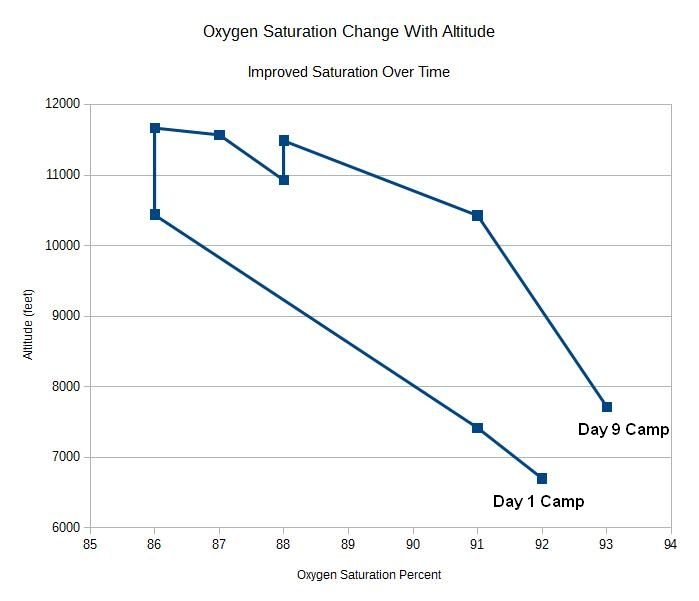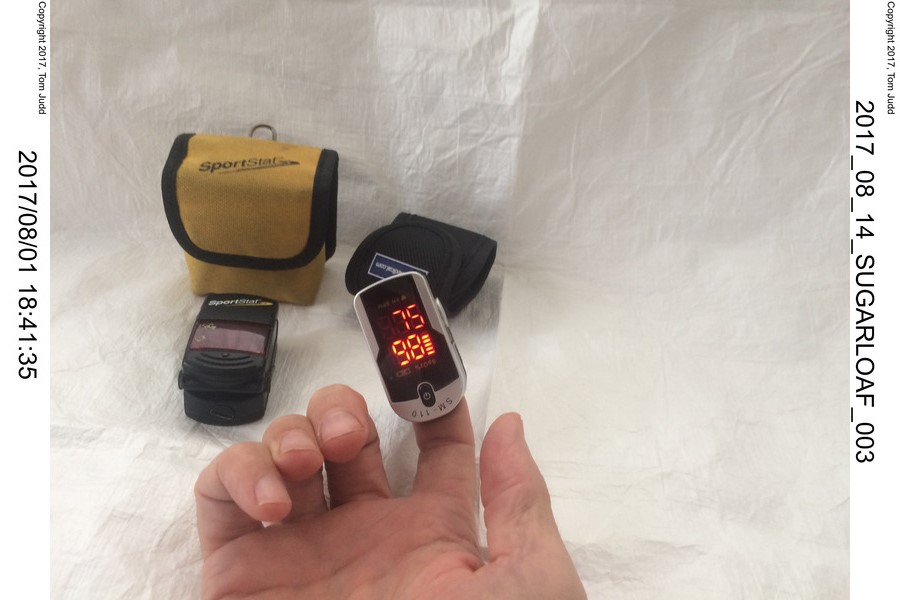Tom Judd <<<>>> Hiking Physiology
This is a work in progress
Physiology
Oxygen Saturation

Hemoglobin in your blood carries oxygen. The percentage saturation of the hemoglobin is a measure of health. For example, a patient with pneumonia may be monitored for oxygen saturation. Oxygen may be administered if the saturation falls too low.
I worked for Nellcor at one time, the original developers of the pulse oximiter. I helped validate the algorithms in the N-20, their first portable device. Devices have gotten much smaller since then (1992). Around 2002 REI sold the SportStat, a miniaturized pulse oximiter for about $400. I got my hands on one and have taken that device on almost all my hikes. Nowadays, you can get one online for $20-$30. Walmart sells one for under $40.

Oxygen saturation decreases when going to higher elevations. There is less oxygen in the air for the hemoglobin to grab. The most interesting observation I have made is that a few days after entering high altitude my oxygen saturation increases by a few percent. Here is quantifiable evidence that hikers can acclimatize by spending days at high elevations prior to a hike.
The plot shows my O2 saturation for one hike to the Kaweah Basin in 2015. At the bottom I have labeled the sample from the first campsite. The samples go clockwise; my saturation initially decreasing as my altitude increases. Once at about 11,000 feet, the saturation slowly increases by a few percent over the next few days. It continues to be higher through the final camp nine.
The body detects the presence of CO2 and uses it to determining how much to breathe. Breathing faster at high altitudes blows off your CO2 but doesn't quite bring in enough O2 . It does raise the blood pH though. The body catches up a few days later by excreting bicarbonate, which lowers the pH and allows more CO2 to dissolve, which signals you to breath more.
A follow-up question might be: Why? What benefit, evolutionary-wise, does it have to develop a temporary system for increasing your oxygen saturation? Perhaps for pneumonia. The extra little benefit might be just enough for survival when congested lungs prevent full oxygenation of your blood.
Water Retention with Exercise at Altitude
I keep track of my weight. I am careful to take my weight the same way each time. I am dressed in T-shirt and shorts only: skivvies. So, I call it my official skivvy weight. Before each hike I write it down in my notepad, and do the same at the end. The high exercise rate with Sierra hiking burns calories. So, I was surprised at first to find that I had not lost that much weight. It did not agree with the calories I knew I was taking in. I knew there was a big calorie deficit but somehow I kept on the weight.
Then in 2003 I looked at my weight a few days after I had returned from my hike. I had dropped three pounds in the few days after I got back. Whoa! That never happens. I quickly surmised that I had retained extra water while hiking which drained out over the course of a few days once my body got back to normal. So why retain water? I came up with a couple of reasons.
I had previously seen water retention with high salt intake. If I eat some salty food before going to bed, my pounding heart will keep me awake until I get up to get a drink of water: more salt, more water, more weight. At sea level I drink a pot of coffee a day. That washes out a lot of sodium. In the mountains I am lucky to drink one cup. In addition, I imagine my body is trying to keep all the water it can. The high and dry Sierras will suck moisture right out of you. It is always a struggle to stay hydrated in the Sierras. I am constantly checking my urine color for signs of dehydration. A saltier system keeps the water around. Once home and hydrating normally, I lose the salt and the extra weight.
Well, that's one explaination. Here's another: I had previously seen water retention in persons with Congestive Heart Failure (CHF). With CHF your heart can't keep up with pumping demands, so you get a backlog of fluid that pushes into the tissue, leading to increased weight. It is not uncommon in a clinical setting for CHF-patients to lose six pounds overnight when placed on a diuretic (Lasix). How could that be related? My heart is super stressed while hiking. Vigorous hiking at altitude might lead to a transitory effect similar to CHF since there is the added stress of the lower oxygen levels impart. So, my extra weight could be due to a pseudo-CHF effect.
No doubt the phenomenon is more complicated, for I haven't even mentioned aldosterone or angiotensin, hormones that regulate the updake of sodium and water. Others have made similar observations and have studied it. It started with Brisket disease, fluid retention leading to heart failure in cattle that graze at high altitudes. For more info see Withey, W., J. Milledge, E. Williams, B. Minty, E. Bryson, N. Luff, M. Older, and J. Beeley 1983 Fluid and electrolyte homeostasis during prolonged exercise at altitude. J. Appl. Physiol. 55:409–412. And https://www.nap.edu/read/5197/chapter/25
©2017,2020 Tom Judd
www.juddzone.com
Carlsbad, CA
USA